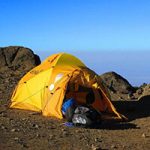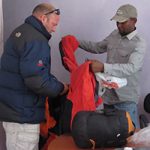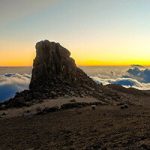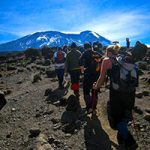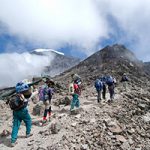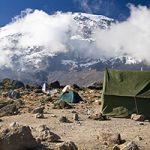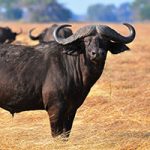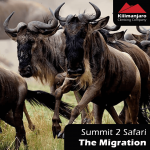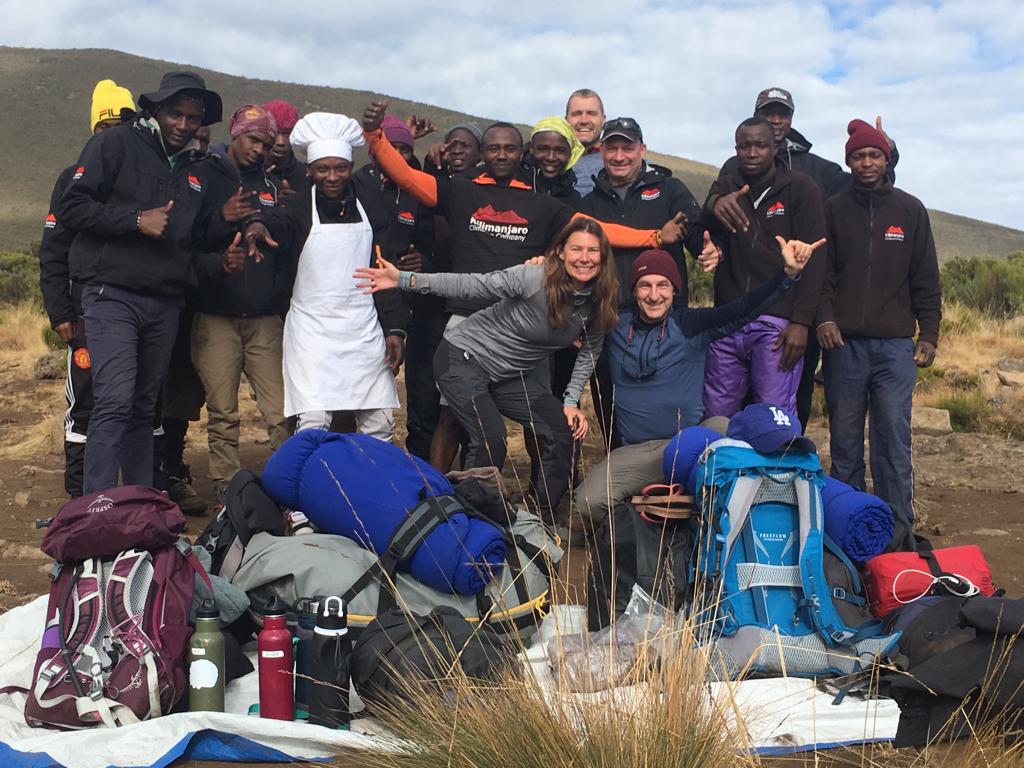OUR MOUNTAIN CREW
MOUNTAIN STAFF
Head guides and support guides lead trekkers up the mountain and ensure the most rigorous safety protocols are in place. Every guide is a certified Wilderness First Responder, fluent in English and Swahili, and experienced with hundreds of professional summits on Kilimanjaro!
Our Chefs will cook you 3 glorious hot meals a day that will fuel you up for the mountain. They are all trained and cater for all dietary requirements. It will amaze you what they can concoct in the extremities of Kilimanjaro!
Camp porters carry the entire camp! The number of porters ranges from approximately 20 – 60 porters and varies based on the number of trekkers and trekking days. It’s quite a remarkable operation! One camp porter per trekker is already included in your trek package to carry your duffel bag with gear that you will not have access to while on the trail (e.g., sleeping bag, camp shoes, toiletries, etc.).
TIPPING GUIDELINES
Tipping on Kilimanjaro is customary and encouraged but not obligatory, however, most climbers feel grateful for their hardworking mountain crew and choose to tip them as a way of thanking them for their contribution to the climb.
Tipping is a common practice on Kilimanjaro, as the crew relies on tips to supplement their salaries. The minimum wage they receive from the government is not enough to provide a livable income. Despite this, tour operators do not increase salaries because many crew members prefer the tipping system, as it allows them to earn a livable wage without reaching the tax threshold.
The mountain crew on Kilimanjaro prefers the tipping system because it is more motivating than a set wage. Crew members who work hard and provide excellent service are rewarded with bigger tips, making tips very important to them. We therefore encourage our clients to budget money for the tipping ceremony for these reasons.
Who are the people in a mountain crew?
Every single Kilimanjaro climb group is accompanied by a mountain crew. This crew consists of:
- a lead guide
- assistant guides
- porters
- helping porters (porters with additional duties) e.g. a Toilet Porter
- a cook
Kilimanjaro guides and porters are hardworking individuals specially trained to support climbers in various ways. They are mostly local Tanzanian men (and some women) aged 18 to 40. While we employ our core staff, many freelance for different companies. Tipping is crucial for their welfare as their work on the mountain is their main source of income.
How big is a Kilimanjaro mountain crew?
The size of a Kilimanjaro mountain crew depends on the number of climbers in the group, with groups typically ranging from two to 20 people.
To give you an idea, a group of four climbers may have a crew of around 21 people, while a group of 12 climbers would require a larger crew of up to 57 people. KCC typically caps their groups at 12 climbers.
Climbers-to-crew ratio
The table below shows the number of people in a KCC mountain crew per group size.
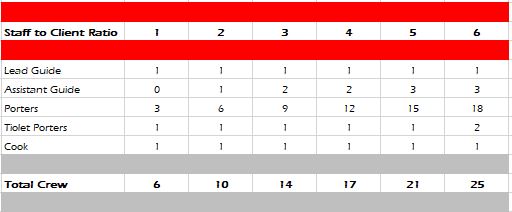

The roles of the different mountain crew members
So we’ve mentioned that a Kilimanjaro mountain crew consists of guides, assistant guides, porters, helper porters, and a cook. Below we explain their different duties and how many of each are needed per climb group.
Lead guide
- 1 per group
- The overall trek leader, responsible for everyone’s health and safety
Assistant guides
- 1 for every 2 or 3 climbers
- They lead you safely and efficiently up the mountain, answer your questions, and monitor your health
Cook
- 1 per group
- Prepares all your food (breakfast, lunch, dinner and snacks)
Porters
- 3 per climber
- They carry food, camping equipment and everyone’s personal belongings, set up and strike camp, and take on various other duties
Helping porters
- The number varies per group
- They work as porters but each has an additional duty such as serving as your waiter, washing dishes or servicing the toilet tent
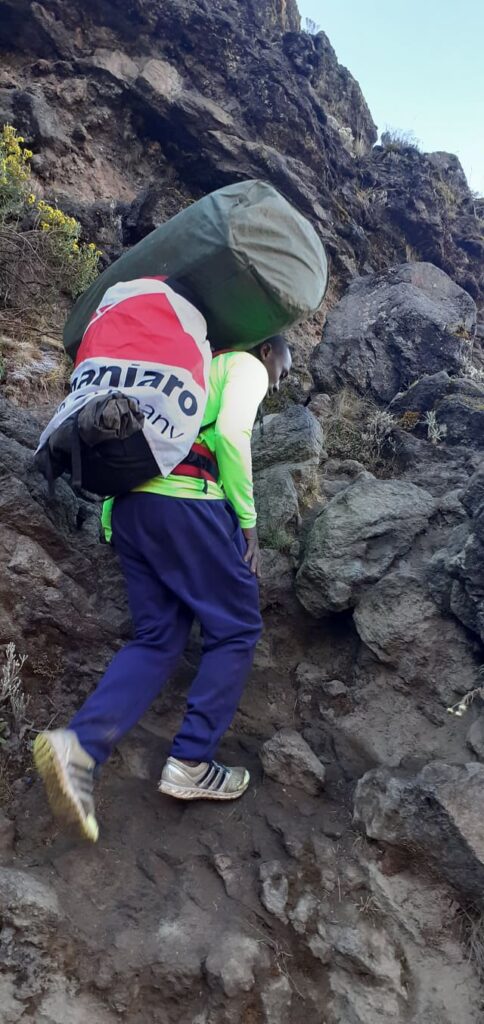

If you’re wondering why each trekker needs three porters, you won’t be the first! The reason for this is that everything you need for your six to nine days on the mountain must be carried there and back. We’re talking:
- Food, crockery and cooking equipment
- Chairs and tables
- Sleeping tents, a mess tent and a toilet tent
- A chemical toilet (or toilets, depending on group size)*
- Sleeping bags and sleeping mats
- Medical supplies
- Personal belongings
As you can see above, the porters have an awful lot of stuff to carry! And each Kilimanjaro porter is only allowed to carry a maximum of 20 kg (44 lb), excluding their own personal gear.
Beware of Kilimanjaro trekking companies that use small mountain crews to save money. These budget operators often overload and overwork their staff, which can compromise the safety and experience of climbers. Make sure to ask about the size of the mountain crew when researching a company to ensure they prioritize the well-being of their staff and climbers.
How much should I be tipping?
It can be challenging to determine the right amount to tip your mountain crew early on in the planning phase. Once the size of your climbing group is set, you can use tables to determine how much to tip. It is important to understand the recommended amount to tip each type of mountain crew member based on their experience and duties.
Daily tipping amounts per mountain crew member
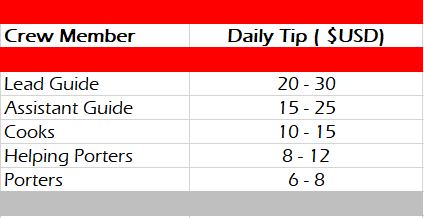

* These tip amounts are our recommendations based on industry standards as of January 2024.
Please ask your lead guide to indicate who is a helping porter and who is a porter. If you have a large mountain crew, it might just be about asking the number of helping porters and the number of porters, as you might not get to meet each one individually.
The longer your climb, the more you tip
Most Kilimanjaro climbs are six to nine days. Given that crew members should be tipped on a daily basis, the longer your climb, the more you’ll tip. The tables below provide overall tips per climber for different route durations.
7 DAY TREK - TIPPING GUIDELINES ( $USD per person)
8 DAY TREK - TIPPING GUIDELINES ( $USD per person)
8 DAY TREK - TIPPING GUIDELINES ( $USD per person)
The tip may seem large, but it’s divided among the entire mountain crew who work hard and support you during your climb. They deserve every penny you can spare to show your appreciation.
Please tip according to the service received
The amount you tip should be based on the quality of service you receive. Tips help motivate the mountain crew to work hard. If you are not satisfied with the service, you can tip less than the recommended amount. For good service, tip within the recommended range, and for exceptional service, consider tipping the maximum amount. However, it is not advisable to tip above the maximum recommendation as it can lead to crews depending on unsustainable tips. If you loved the service, tip each crew member the highest recommended daily amount for their job type.
What currency should I use for my tips?
Kilimanjaro tipping can be done in US dollars or Tanzanian shillings (TSh). Other currencies aren’t helpful to the crew.
We suggest withdrawing enough dollars before you travel to Tanzania, or drawing the necessary cash at the airport. Once you head to Kilimanjaro for your climb, you won’t have an opportunity to get your hands on cash.
Please note that it’s very important that US bills are new (post 2013), crisp, and untorn. Otherwise they won’t be accepted by the local banks.
When do I hand over my tips?
Climbers give tips to the mountain crew during the tipping ceremony at the end of a climb.
It’s very helpful to bring an assortment of notes for tipping on Kilimanjaro. In this way the climb group’s appointed spokesperson can divide the cash into the appropriate portions for each member of the mountain crew.




